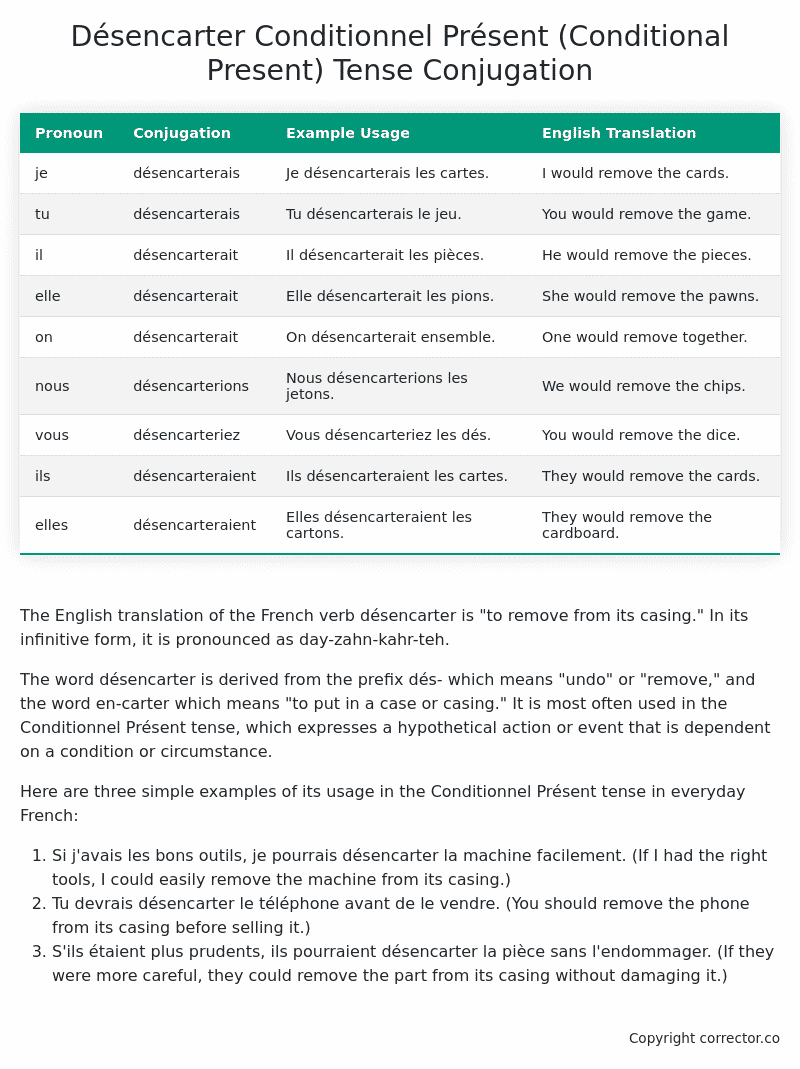Conditionnel Présent (Conditional Present) Tense Conjugation of the French Verb désencarter
Introduction to the verb désencarter
The English translation of the French verb désencarter is “to remove from its casing.” In its infinitive form, it is pronounced as day-zahn-kahr-teh.
The word désencarter is derived from the prefix dés- which means “undo” or “remove,” and the word en-carter which means “to put in a case or casing.” It is most often used in the Conditionnel Présent tense, which expresses a hypothetical action or event that is dependent on a condition or circumstance.
Here are three simple examples of its usage in the Conditionnel Présent tense in everyday French:
- Si j’avais les bons outils, je pourrais désencarter la machine facilement. (If I had the right tools, I could easily remove the machine from its casing.)
- Tu devrais désencarter le téléphone avant de le vendre. (You should remove the phone from its casing before selling it.)
- S’ils étaient plus prudents, ils pourraient désencarter la pièce sans l’endommager. (If they were more careful, they could remove the part from its casing without damaging it.)
Table of the Conditionnel Présent (Conditional Present) Tense Conjugation of désencarter
| Pronoun | Conjugation | Example Usage | English Translation |
|---|---|---|---|
| je | désencarterais | Je désencarterais les cartes. | I would remove the cards. |
| tu | désencarterais | Tu désencarterais le jeu. | You would remove the game. |
| il | désencarterait | Il désencarterait les pièces. | He would remove the pieces. |
| elle | désencarterait | Elle désencarterait les pions. | She would remove the pawns. |
| on | désencarterait | On désencarterait ensemble. | One would remove together. |
| nous | désencarterions | Nous désencarterions les jetons. | We would remove the chips. |
| vous | désencarteriez | Vous désencarteriez les dés. | You would remove the dice. |
| ils | désencarteraient | Ils désencarteraient les cartes. | They would remove the cards. |
| elles | désencarteraient | Elles désencarteraient les cartons. | They would remove the cardboard. |
Other Conjugations for Désencarter.
Le Present (Present Tense) Conjugation of the French Verb désencarter
Imparfait (Imperfect) Tense Conjugation of the French Verb désencarter
Passé Simple (Simple Past) Tense Conjugation of the French Verb désencarter
Passé Composé (Present Perfect) Tense Conjugation of the French Verb désencarter
Futur Simple (Simple Future) Tense Conjugation of the French Verb désencarter
Futur Proche (Near Future) Tense Conjugation of the French Verb désencarter
Plus-que-parfait (Pluperfect) Tense Conjugation of the French Verb désencarter
Passé Antérieur (Past Anterior) Tense Conjugation of the French Verb désencarter
Futur Antérieur (Future Anterior) Tense Conjugation of the French Verb désencarter
Subjonctif Présent (Subjunctive Present) Tense Conjugation of the French Verb désencarter
Subjonctif Passé (Subjunctive Past) Tense Conjugation of the French Verb désencarter
Subjonctif Imparfait (Subjunctive Imperfect) Tense Conjugation of the French Verb désencarter
Conditionnel Présent (Conditional Present) Tense Conjugation of the French Verb désencarter (this article)
Conditionnel Passé (Conditional Past) Tense Conjugation of the French Verb désencarter
L’impératif Présent (Imperative Present) Tense Conjugation of the French Verb désencarter
L’infinitif Présent (Infinitive Present) Tense Conjugation of the French Verb désencarter
Struggling with French verbs or the language in general? Why not use our free French Grammar Checker – no registration required!
Get a FREE Download Study Sheet of this Conjugation 🔥
Simply right click the image below, click “save image” and get your free reference for the désencarter Conditionnel Présent tense conjugation!

Désencarter – About the French Conditionnel Présent (Conditional Present) Tense
Formation
Common Everyday Usage Patterns
Expressing Polite Requests
Expressing Hypothetical Situations
Expressing Doubt or Uncertainty
Interactions with Other Tenses
Present Tense
Past Tense
Future Tense
Conditional Perfect
Summary
Want More?
I hope you enjoyed this article on the verb désencarter. Still in a learning mood? Check out another TOTALLY random French verb conjugation!


